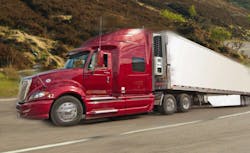Emissions regulations set to change refrigeration, APU choices
Federal regulations covering “non-road diesel engines” and California ones addressing “transportation refrigeration units” (TRUs) are driving significant changes in the designs of trailer and truck reefer units as well as auxiliary power units (APUs). The new designs should offer substantial gains in fuel efficiency as well as cleaner emissions, but will also require fleets to make informed decisions about required capacity and trade cycles, according to Doug Lenz, director of product management and marketing for Thermo King.
The complex Tier IV Final emissions standards from the U.S. Environmental Protection Agency (EPA) go into effect on Jan. 1, 2013 and divide non-road diesels into two categories – under 25 HP and over 25 HP. In simple terms, the under 25 category does not come under stricter particulate matter (PM) and oxides of nitrogen (NOx) emissions limits, but changes the certification testing procedure to make it more difficult to certify that engines will remain under those limits under all operating conditions.
APUs, truck refrigeration units and some trailer reefers as well typically use diesels rated less than 25 HP. Satisfying the new testing requirement for Thermo King’s TriPac APU and T-Series truck reefer was largely achieved with new, more sophisticated control systems that carefully manage loads under varying conditions, according to the company.
For example, the 2013 model APU, which will be renamed TriPac Evolution controls engine output based on amperage as well as voltage loads. The result is lower run times, better fuel efficiency and longer maintenance intervals, according to the company.
Similarly the T-Series will meet the 2013 federal rules with some modifications to its current diesel and an entirely new control system. The redesign results not only in cleaner emissions, but up to a 30% reduction in fuel consumption, up to 50% faster pull-downs to setpoint temperatures and reductions in run times of up to 17%, according to Scott Bates, truck product manager.
Earlier this summer, Carrier Transicold announced a similar approach it calls “echoForward technologies” for its 2013 transportation refrigeration systems under 25 HP.
Over 25 HP, the Tier IV Final standards do significantly lower emissions limits, reducing permissible PM by 90% and NOx by around 37% compared to current limits. Meeting those stricter limits for its higher capacity trailer units required an all-new platform with a new engine and emissions systems, according to Lenz. Introduced at Thermo King headquarters in Minneapolis last week, the new Precedent Series uses “EGR lite,” common rail fuel injection and advanced electronic controls to surpass EPA requirements without the need for selective catalytic reduction (SCR) or diesel particulate filter (DPF) aftertreatment, according to Lenz.
One major advantage of the all-new engine approach is its impact on trade cycles. California Air Resource Board (CARB) rules intended to limit PM levels from TRUs will require current over 25 HP units that meet the 2013 Tier IV Final limits to either retrofit those engines with diesel particulate filters (DPFs) or replace the diesels after seven years. Those rules cover any vehicle transiting California, not just those domiciled in the state, which would limit many over-the-road fleets to a seven-year trade cycle on their refrigerated trailers and reduced residuals on those trailers.
The new diesel powering the Precedent Series, however, meets CARB’s stricter “ultra low emissions” requirements and is therefore considered “an evergreen engine,” meaning it can continue to operate in California beyond seven years without a DPF retrofit or engine swap, according to Thermo King. That gives fleets buying the new units the flexibility to move or resell their equipment anywhere in the country without damaging residual values or incurring expensive retrofit costs, according to the company.
About the Author
Jim Mele
Jim Mele is a former longtime editor-in-chief of FleetOwner. He joined the magazine in 1986 and served as chief editor from 1999 to 2017.
